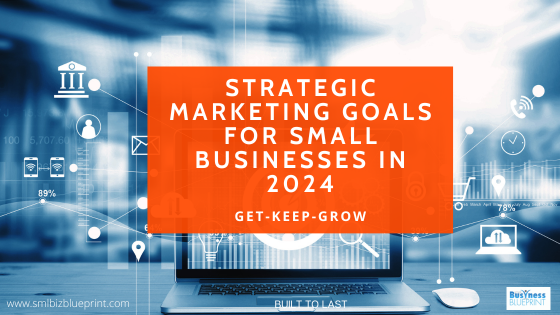Setting the right marketing goals can make all the difference between thriving and merely surviving.
As a small business owner, staying ahead of the curve and making informed decisions that set you on a path to success is crucial.
In this comprehensive guide, we will outline seven marketing goals tailored to small businesses in 2024.
These goals are not just mere resolutions; they are actionable strategies that will establish your authority, engage your audience, and drive your business towards unparalleled success.

Goal 1: Define Your Target Audience
To succeed in 2024, small businesses must start by clearly defining their target audience.
Knowing who your customers are, their preferences, and behaviours will guide your marketing efforts. Use surveys, analytics, and social media insights to gather this invaluable information.
Understand that personalised marketing resonates with audiences and is your key to building trust and loyalty.
Action
Conduct In-Depth Research: Use online surveys, social media analytics, and customer feedback to gather insights about your audience’s preferences and behaviours.
Create Buyer Personas: Develop detailed buyer personas that represent different segments of your target audience, helping you tailor your marketing efforts effectively.
Regularly Update Audience Data: Keep your audience data up-to-date to adapt your strategies as customer preferences evolve.
Goal 2: Enhance Your Online Presence
Your online presence is your digital storefront, and it must be impeccable. Invest in a user-friendly, responsive website that reflects your brand’s identity.
Optimise it for search engines to increase your visibility. Don’t forget the power of social media platforms; regularly update content and engage with your audience.
Consider incorporating AI-driven chatbots to enhance the online experience for your visitors.
Action
Invest in Website Optimization: Ensure your website is responsive, loads quickly, and provides a seamless user experience on all devices.
Implement SEO Strategies: Optimize your website’s content for search engines to increase its visibility in search results.
Actively Engage on Social Media: Regularly update your social media profiles with engaging content and respond promptly to audience interactions.
Goal 3: Content Marketing Strategy
Content is king, and in 2024, it’s your golden ticket to establishing expertise. Create high-quality, informative, and relevant content that addresses your audience’s pain points.
This could be blog posts, videos, infographics, or podcasts. Share success stories, case studies, and hypothetical scenarios to illustrate your points.
A well-crafted content marketing strategy will showcase your industry knowledge and build credibility.
Action
Identify Pain Points: Research your audience’s pain points and create content that addresses their specific challenges and needs.
Diversify Content Formats: Experiment with various content types, such as blog posts, videos, infographics, and podcasts, to reach a broader audience.
Share Success Stories: Highlight case studies and success stories to showcase how your products or services have positively impacted customers.
Goal 4: Data-Driven Decision Making
Data is the compass that will guide your marketing ship to success. Identify key performance indicators (KPIs) relevant to your business and track them diligently.
AI can assist in predictive analytics and customer behaviour analysis, offering insights to steer your marketing strategies in the right direction.
Embrace data-driven decision-making to make informed choices that yield results.
Action
Define Key Metrics: Identify and track key performance indicators (KPIs) relevant to your business, such as conversion rates, customer acquisition cost (CAC), and customer lifetime value (CLV).
Implement Analytics Tools: Use analytics tools and platforms to gather data on user behaviour, website traffic, and marketing campaign performance.
Leverage AI Insights: Utilize AI-driven analytics to gain predictive insights and make data-backed decisions for your marketing strategies.

Goal 5: Diversify Marketing Channels
Relying on a single marketing channel can be risky. Diversify your efforts across various channels, such as email marketing, paid advertising, and influencer partnerships.
Consider AI-powered ad targeting and optimisation to maximize your reach and effectiveness. Being present where your audience is ensures that you remain competitive in the market.
Action
Explore Email Marketing: Develop targeted email campaigns to nurture leads and engage existing customers.
Embrace Influencer Partnerships: Collaborate with industry influencers to reach a wider audience and build trust through endorsements.
Utilise Paid Advertising: Invest in paid advertising platforms like Google Ads and social media ads to expand your reach and target specific demographics.
Goal 6: Implementing AI into Business Operations
Automation and AI-driven solutions are not just buzzwords but tools that can revolutionise your business operations.
From chatbots that offer immediate customer support to data-driven AI for better decision-making, integrating AI into your operations enhances efficiency. It reduces costs, leaving you more time to focus on strategic growth.
Action
Integrate AI Chatbots: Implement AI chatbots on your website to provide instant customer support and gather valuable user data.
Automate Routine Tasks: Use AI to automate repetitive tasks, such as data entry and customer inquiries, to free up time for strategic activities.
Adopt AI Analytics Tools: Leverage AI-driven analytics tools to gain deeper insights into customer behaviour and preferences for more personalized marketing.
Goal 7: Strengthen Customer Engagement and Loyalty
Customer engagement and loyalty are the cornerstones of long-term success. Implement AI-driven CRM tools to personalise interactions, gather feedback, and reward loyal customers.
Share real success stories of how your business has benefited clients to showcase your commitment to their success.
Action
Personalize Customer Interactions: Use AI-powered CRM tools to tailor interactions, recommend products, and deliver personalised offers.
Gather Customer Feedback: Actively seek feedback through surveys and reviews to identify areas for improvement and demonstrate your commitment to customer satisfaction.
Reward Loyalty: Implement loyalty programs or offer exclusive discounts to reward and retain loyal customers, encouraging repeat business.
By setting and achieving these seven marketing goals in 2024, small business owners can position themselves as industry leaders, foster customer loyalty, and drive growth.
Start now and take your business to new heights.
Must Haves
Define Your Target Audience:
Identifying and understanding your target audience is paramount. It allows you to tailor your marketing efforts effectively, build trust, and foster customer loyalty. Use tools like surveys and analytics to gather essential information about your audience’s demographics, interests, and behaviours.
Content Marketing Strategy:
Content is a powerful tool for establishing expertise and credibility. High-quality, relevant content that addresses your audience’s needs can differentiate your brand and attract a loyal following. Share success stories and case studies to illustrate your points and connect with your audience on a personal level.
Implement AI into Business Operations:
Embracing AI-driven solutions can streamline your business operations, reduce costs, and enhance customer experiences. Integrating AI into your business can help you stay competitive in the evolving market landscape, from AI chatbots for customer support to predictive analytics for data-driven decision-making.

Additional Options
Nurturing Employee Advocacy:
Encourage your employees to become brand advocates. In an era where authenticity and human connection matter, employees can be your most significant assets. Their authentic endorsement of your brand on social media and other platforms can boost credibility and trust. Share stories of how employees have contributed to your brand’s success.
Leveraging User-Generated Content (UGC):
UGC, such as customer reviews, photos, and videos, can be a potent marketing tool. Showcase UGC on your website and social media to build trust and authenticity. Highlight instances where customers have shared their positive experiences with your products or services. Share UGC that aligns with your brand’s values and resonates with your target audience.
Gamification in Marketing:
Consider incorporating gamification elements into your marketing strategy. Gamification can engage your audience and foster loyalty. Share examples of businesses that have successfully used gamification to incentivise customer participation, such as loyalty point systems or interactive contests.
FAQs
Q1: How can I identify my target audience effectively?
A1: You can identify your target audience through surveys, social media insights, and analytics tools. Understand their demographics, preferences, and behaviours to tailor your marketing efforts.
Q2: What are some essential KPIs for small businesses to track?
A2: Key performance indicators (KPIs) can include website traffic, conversion rates, customer acquisition cost (CAC), customer lifetime value (CLV), and email open rates, among others.
Q3: How can AI benefit small businesses in marketing?
A3: AI can enhance personalisation, automate tasks, offer predictive analytics, and optimise ad campaigns, leading to more efficient marketing strategies.
Q4: Are there AI tools for small businesses that don’t require extensive technical knowledge?
A4: Many user-friendly AI tools are designed specifically for small businesses, making implementation accessible to all.
Q5: What’s the best way to engage customers and build loyalty?
A5: Engage customers through personalised interactions and reward programs. Show them you value their loyalty by delivering exceptional service and demonstrating how your business has positively impacted others.
Conclusion:
In the fast-paced world of small business, staying ahead means setting the right marketing goals. By defining your audience, enhancing your online presence, and implementing AI-driven strategies, you’ll survive and thrive in 2024.
These seven goals are your roadmap to success. Start your journey today and secure a prosperous future for your business.

